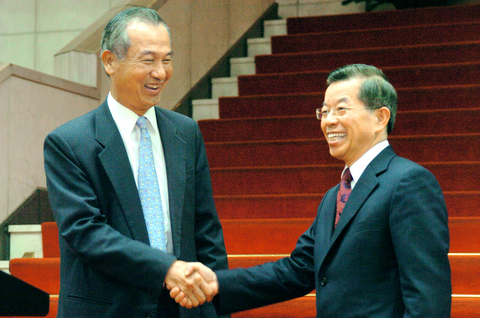Taiwan Institute of Economic Research (TIER) President Wu Rong-i (
"I am quite confident that I will take advantage of my expertise in economic issues to provide my professional analysis, study and advice to help Premier Frank Hsieh," Wu said during a press conference at the Cabinet yesterday morning.

PHOTO: SEAN CHAO, TAIPEI TIMES
After Hsieh became premier on Jan. 25, he lobbied to have KMT lawmaker Chiang Pin-kun (江丙坤), who is also vice chairman of the party and former chairman of the Council for Economic Planning and Development, to become vice premier. However, KMT Chairman Lien Chan (連戰) never gave his blessing to the appointment, and so Chiang did not give Hsieh an answer to his offer.
Hsieh said that he had considered Wu as a second choice for the spot, because his priority had been to try to get a member of the opposition camp to join the Cabinet.
"While I first spoke with Wu, I explained clearly to him that my priority was Chiang due to political concerns, and he understood and supported me for this arrangement," Hsieh said. "For that, I appreciate his understanding and would like to apologize to him for keeping him waiting and making him my second choice."
At the press conference, Hsieh said that he had opened the door to Chiang to join the Cabinet, but that he could not keep his team and the public waiting indefinitely.
Wu is a well-known supporter of former president Lee Teng-hui's (
Asked whether he will continue to urge local enterprises not to invest in or move their facilities to China, Wu said that he will merely provide his professional advice to his superiors.
Opposition parties were negative in their reaction to the news of Wu's appointment yesterday.
"Currently, I can't see how this appointment will have any effect on improving Taiwan's economy, because Wu Rong-i is conservative in his policy about investing in China," People First Party (PFP) legislative whip Liu Wen-hsiung (
"The KMT respects the wishes of the DPP and the premier," said Chinese Nationalist Party (KMT) legislative caucus whip Huang Teh-fu (黃德福) yesterday. "What we care about the most is whether they will nominate capable individuals. But from past examples, we can see that even if talented individuals enter the Chen Shui-bian administration, under a such a willful leadership, those individuals will burn out."
Leaders of business groups, who have been urging that someone with a business background be named as vice premier, yesterday welcomed Wu's appointment, but also expressed regret that Chiang had not taken up the post.
"Wu is an appropriate pick for the position, considering his sophisticated management ability and insights into macroeconomic and industrial policies," Theodore Huang (
Although Wu has less political experience than Chiang, as president of the Taiwan Institute of Economic Research (
Wu possesses a doctoral degree in economics from Katholieke Universiteit Leuven in Belgium. He has been president of TIER since 1994. Prior to that post, he was an economics professor and director at National Chung Hsing University. Wu has also been a senior economic advisor to different government offices, including the Presidential Office, the Cabinet and the Ministry of Finance.

SECURITY: As China is ‘reshaping’ Hong Kong’s population, Taiwan must raise the eligibility threshold for applications from Hong Kongers, Chiu Chui-cheng said When Hong Kong and Macau citizens apply for residency in Taiwan, it would be under a new category that includes a “national security observation period,” Mainland Affairs Council (MAC) Minister Chiu Chui-cheng (邱垂正) said yesterday. President William Lai (賴清德) on March 13 announced 17 strategies to counter China’s aggression toward Taiwan, including incorporating national security considerations into the review process for residency applications from Hong Kong and Macau citizens. The situation in Hong Kong is constantly changing, Chiu said to media yesterday on the sidelines of the Taipei Technology Run hosted by the Taipei Neihu Technology Park Development Association. With

CARROT AND STICK: While unrelenting in its military threats, China attracted nearly 40,000 Taiwanese to over 400 business events last year Nearly 40,000 Taiwanese last year joined industry events in China, such as conferences and trade fairs, supported by the Chinese government, a study showed yesterday, as Beijing ramps up a charm offensive toward Taipei alongside military pressure. China has long taken a carrot-and-stick approach to Taiwan, threatening it with the prospect of military action while reaching out to those it believes are amenable to Beijing’s point of view. Taiwanese security officials are wary of what they see as Beijing’s influence campaigns to sway public opinion after Taipei and Beijing gradually resumed travel links halted by the COVID-19 pandemic, but the scale of

A US Marine Corps regiment equipped with Naval Strike Missiles (NSM) is set to participate in the upcoming Balikatan 25 exercise in the Luzon Strait, marking the system’s first-ever deployment in the Philippines. US and Philippine officials have separately confirmed that the Navy Marine Expeditionary Ship Interdiction System (NMESIS) — the mobile launch platform for the Naval Strike Missile — would take part in the joint exercise. The missiles are being deployed to “a strategic first island chain chokepoint” in the waters between Taiwan proper and the Philippines, US-based Naval News reported. “The Luzon Strait and Bashi Channel represent a critical access

Pope Francis is be laid to rest on Saturday after lying in state for three days in St Peter’s Basilica, where the faithful are expected to flock to pay their respects to history’s first Latin American pontiff. The cardinals met yesterday in the Vatican’s synod hall to chart the next steps before a conclave begins to choose Francis’ successor, as condolences poured in from around the world. According to current norms, the conclave must begin between May 5 and 10. The cardinals set the funeral for Saturday at 10am in St Peter’s Square, to be celebrated by the dean of the College